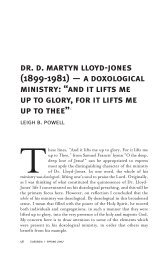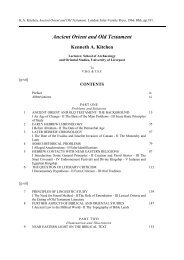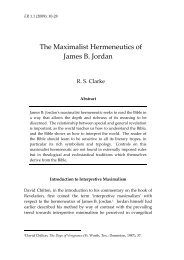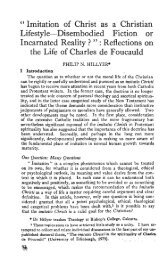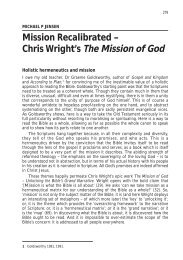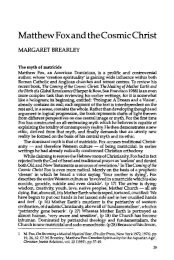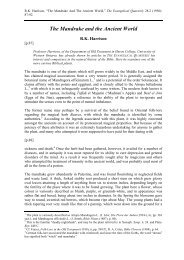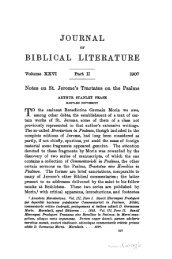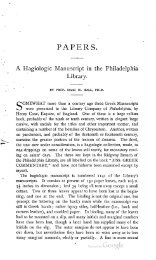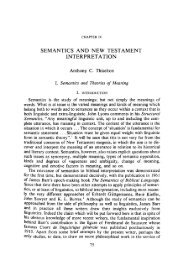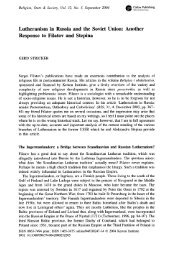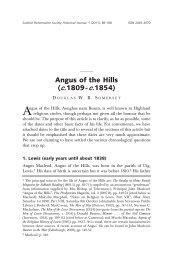The Language of the Epistle to the Hebrews as Bearing upon Its ...
The Language of the Epistle to the Hebrews as Bearing upon Its ...
The Language of the Epistle to the Hebrews as Bearing upon Its ...
Create successful ePaper yourself
Turn your PDF publications into a flip-book with our unique Google optimized e-Paper software.
LANGUAGE OF THE EPISTLE TO THE HEBREWS.<br />
25<br />
More than this: he w<strong>as</strong> a Levite. <strong>The</strong> particular line <strong>of</strong> argument<br />
adopted in <strong>the</strong> main part <strong>of</strong> <strong>the</strong> Ep. <strong>to</strong> <strong>the</strong> Heb. is one which would<br />
have occurred <strong>to</strong> few, and scarcely <strong>to</strong> any who w<strong>as</strong> not familiar with<br />
<strong>the</strong> temple ritual. <strong>The</strong>re is no evidence that this w<strong>as</strong> <strong>the</strong> c<strong>as</strong>e with<br />
Apollos; but with Barnab<strong>as</strong> <strong>the</strong> temple service w<strong>as</strong> a matter <strong>of</strong> pr<strong>of</strong>essional<br />
duty, <strong>as</strong> well <strong>as</strong> <strong>the</strong> prompting <strong>of</strong> his devout heart. Indeed,<br />
an objection <strong>to</strong> <strong>the</strong> authorship <strong>of</strong> Barnab<strong>as</strong> h<strong>as</strong> been b<strong>as</strong>ed on this<br />
very point;- it is said that <strong>the</strong> author does not show that nicely<br />
accurate precision in his statements which might be expected from<br />
one personally familar with <strong>the</strong> temple. <strong>The</strong> points referred <strong>to</strong> admit<br />
<strong>of</strong> e<strong>as</strong>y explanation on o<strong>the</strong>r grounds; but were <strong>the</strong>y better taken, considering<br />
that <strong>the</strong> service <strong>of</strong> <strong>the</strong> Levites w<strong>as</strong> al<strong>to</strong>ge<strong>the</strong>r subordinate <strong>to</strong><br />
that <strong>of</strong> <strong>the</strong> priests, and did not lead <strong>the</strong>m in<strong>to</strong> <strong>the</strong> vado itself, <strong>the</strong><br />
objection seems hypercritical. It is not unlikely that when Barnab<strong>as</strong><br />
became a Christian he w<strong>as</strong> on duty in <strong>the</strong> temple precincts, and came<br />
in<strong>to</strong> <strong>the</strong> Church among that "great company <strong>of</strong> <strong>the</strong> priests " who<br />
"were obedient <strong>to</strong> <strong>the</strong> faith" (Acts vi. 7).<br />
<strong>The</strong> only important objection proposed <strong>to</strong> <strong>the</strong> authorship <strong>of</strong> Barnab<strong>as</strong><br />
is, that from <strong>the</strong> time <strong>of</strong> Tertullian down, <strong>the</strong>re h<strong>as</strong> never been<br />
any considerable weight <strong>of</strong> opinion in its favor. This is e<strong>as</strong>ily<br />
accounted for by <strong>the</strong> almost universal acceptance <strong>of</strong> <strong>the</strong> so-called<br />
Ep. <strong>of</strong> Barnab<strong>as</strong> <strong>as</strong> his work. <strong>The</strong> two could not have been written<br />
by <strong>the</strong> same person. But since that epistle h<strong>as</strong> been abundantly<br />
proved <strong>to</strong> have been <strong>the</strong> work <strong>of</strong> ano<strong>the</strong>r, and is probably <strong>of</strong> a somewhat<br />
later age, <strong>the</strong>re is nothing <strong>to</strong> hinder <strong>the</strong> belief that <strong>the</strong> devout<br />
Levite <strong>of</strong> Cyprus, <strong>the</strong> early convert <strong>to</strong> Christianity while still in strong<br />
sympathy with <strong>the</strong> Christian Jews, <strong>the</strong> man <strong>of</strong> benevolence and wealth,<br />
and <strong>the</strong>refore probably <strong>of</strong> education, by birth <strong>the</strong> appointed servant<br />
<strong>of</strong> <strong>the</strong> temple, <strong>the</strong> man <strong>of</strong> independence and dignity, and yet <strong>of</strong> such<br />
tender sympathy <strong>as</strong> <strong>to</strong> be surnamed "<strong>the</strong> son <strong>of</strong> consolation," <strong>the</strong><br />
long and intimate companion <strong>of</strong> S. Paul, and for years in <strong>the</strong> position<br />
<strong>of</strong> his superior, - <strong>the</strong>re is nothing <strong>to</strong> hinder <strong>the</strong> acceptance <strong>of</strong> <strong>the</strong><br />
early ecclesi<strong>as</strong>tical statement that he w<strong>as</strong> also <strong>the</strong> author <strong>of</strong> <strong>the</strong> <strong>Epistle</strong><br />
<strong>to</strong> <strong>the</strong> <strong>Hebrews</strong>.




